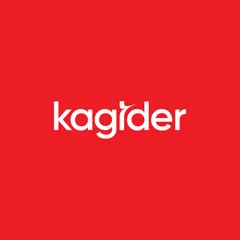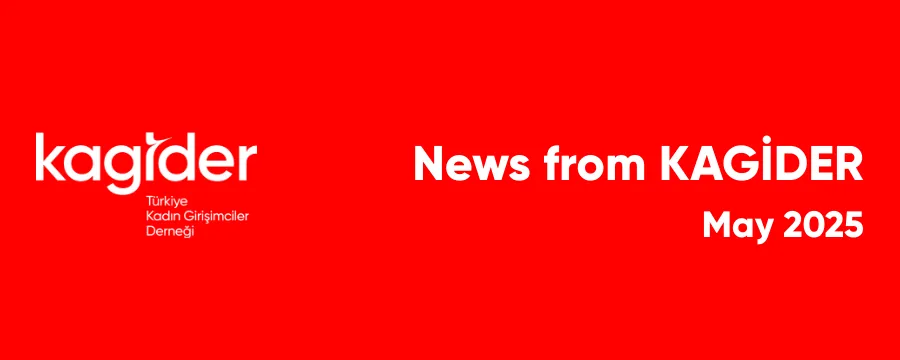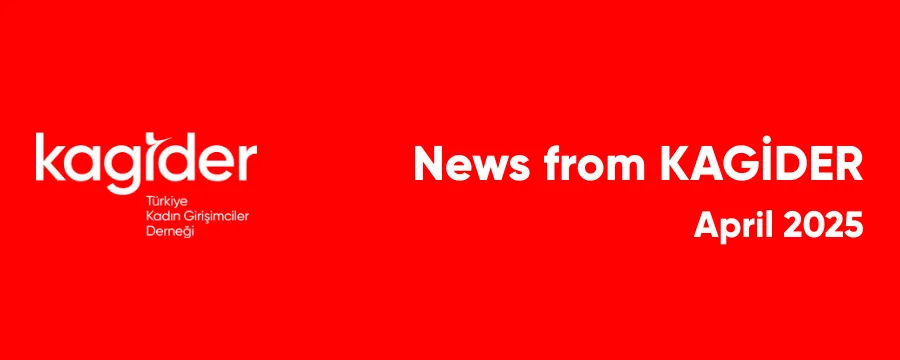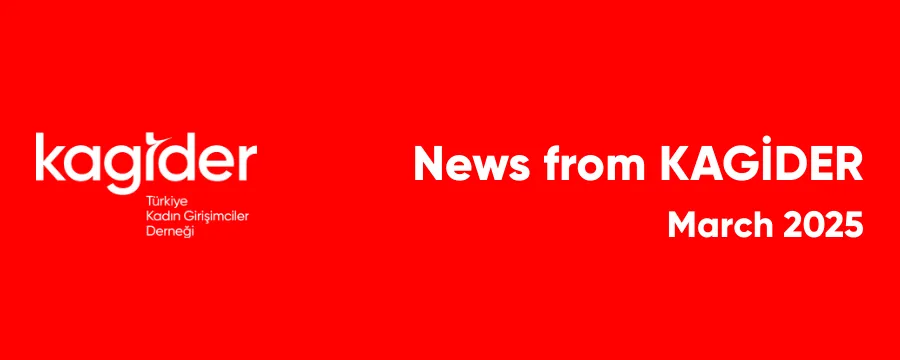Written by KAGİDER Economic Advisor Özlem Derici Şengül: A Rise in Interest Rates, Growth, and Inflation
In this month's outlook, we have summarized the key economic developments in Turkey and shared our insights on their potential impacts. The main highlights are as follows:
- The Central Bank of the Republic of Turkey (CBRT) continues its efforts to phase out the FX-Protected Deposit Scheme (KKM).
- Outlook upgrades from credit rating agencies.
- Inflation exceeds 60% in September.
- CBRT raised the policy rate from 25% to 30%.
- Commercial loan interest rates reached 46%, while 3-month deposit rates hit 45%.
- Slight improvement in growth indicators such as the real sector confidence index and industrial production.
- The 2023 Nobel Prize in Economics was awarded to Claudia Goldin for her work on female labor force participation.
Continued Exit from KKM
According to new regulations issued to banks in September, the minimum interest rate requirement was lifted for Turkish Lira-based FX-protected deposits (KKM). This allows banks to offer rates below the policy rate. Previously, they were only allowed to offer up to CBRT policy rate + 3 points. Additionally, the CBRT introduced new requirements for banks to increase the share of standard TL deposits, raising the monthly TL share target from 2% to 2.5%. The commission exemption that allowed KKM to count toward TL deposit requirements has been removed.
(Note: The FX-Protected Deposit Scheme, launched in December 2021, compensates account holders for the difference if currency depreciation exceeds the deposit interest rate.)
Fitch and S\&P Update Outlook
Fitch affirmed Turkey’s credit rating at “B” and revised the outlook from “Negative” to “Stable,” citing a return to more conventional policies. However, a rating upgrade requires actual improvements in inflation, current account, and budget deficits.
S\&P also maintained Turkey’s rating at “B” and revised the outlook to “Stable,” expecting continued interest rate hikes and stronger foreign exchange reserves. It suggested that by 2026, Turkey may shift from debt-financed consumption to a more balanced external and fiscal position, with lower inflation levels, especially as political uncertainty subsides.
CBRT Continues Rate Hikes
As expected, the CBRT raised the policy rate from 25% to 30%, reaffirming its commitment to tight monetary policy. While the decision had limited market impact due to being widely anticipated, further tightening is expected to influence market rates. The CBRT’s statement included key points:
- Monthly inflation is expected to begin declining.
- End-of-year inflation may hover around the upper bound of its forecast.
- Domestic and foreign demand for TL assets is rising, which may support price stability.
Sharp Rise in Market Interest Rates
By end-September, commercial loan interest rates rose from 32.3% to 46%, and consumer loan rates approached 60%.
3-month deposit rates increased from 25.1% to 45.2%, and 1-month rates from 27.0% to 33.2%.
The combination of CBRT hikes, higher inflation expectations, and KKM-to-TL conversion pressures are pushing rates even higher. While this is positive for inflation outlooks, it could strain business working capital.
Annual Inflation Exceeds 60%
After consecutive monthly CPI increases of over 9% in July and August, September inflation came in at 4.75%—slightly below the market expectation of 4.9%. Annual inflation rose from 58.9% to 61.5%.
Persistent price pressure in services, lingering cost factors, and exchange rate pass-through suggest inflation will remain elevated in the coming months.
CBRT is likely to continue tightening, albeit at a slower pace.
We may see inflation peak near 70% by Q2 of next year before gradually declining toward 50% by year-end.
CBRT’s forecast is 58% for end-2023 and 33% for end-2024, though an upward revision in the upcoming November Inflation Report is likely.
Producer Inflation at 47.4%
Producer Price Inflation (PPI) declined from 49.4% to 47.4% YoY in September due to base effects.
Although energy inflation fell from 20.7% to 13.4%, rising oil prices and increased natural gas and electricity costs for industry are expected to push PPI higher in the coming months. This could pass through to consumer prices by November.
World Bank Revises Growth Forecast
The World Bank raised Turkey’s 2023 growth forecast from 3.5% to 4.2%, citing strong durable goods demand and reduced policy uncertainty. Forecasts for 2024 and 2025 are 3.1% and 3.9%, respectively.
Current Account Deficit: \$5.5 Billion in July
Turkey posted a current account deficit of \$5.5 billion in July, exceeding the \$4.75 billion market expectation and up from \$3.5 billion a year earlier.
The 12-month rolling deficit rose from \$56.5 billion in June to \$58.5 billion.
Excluding gold and energy, the surplus declined from \$42.1 billion to \$38.5 billion.
The deterioration stems from both goods and services balances.
Looking ahead, measures to cool domestic demand and falling gold imports should help reduce the deficit below \$50 billion by year-end.
Foreign Trade Deficit at \$8.7 Billion in August
In line with preliminary data, the August trade deficit was \$8.7 billion, down from \$11.3 billion a year earlier.
This improvement was driven by a narrowing energy trade gap—from \$7.1 billion to \$3.7 billion.
Core trade deficit (excluding gold and energy) remained flat at \$23.9 billion.
Exports rose 1.6% YoY to \$21.6 billion, while imports fell 6.9% to \$30.3 billion.
Tight monetary policies appear to be restraining core import demand, with non-gold and non-energy imports growing only 0.75% YoY.
Real Sector Confidence Shows Modest Improvement
The Real Sector Confidence Index rose 0.5% MoM in September to 105.1.
This was driven by improved economic outlook and inventory buildup.
Sub-indices:
- General business outlook +4.6%
- Finished goods inventory +1.3%
- 3-month employment expectations +2.4%
However, production volume shrank by 0.2%, and export orders declined by 0.4%. Investment spending increased slightly by 0.3%.
Turkey Manufacturing PMI Rises, Still in Contraction
The Istanbul Chamber of Industry’s Manufacturing PMI rose from 49.0 to 49.6 in September—still below the neutral 50.0 threshold.
Declines in total and export orders kept the index in contraction territory, though easing price pressures and slight employment gains led to the improvement.
Input inventories fell due to lower demand, while logistics disruptions and high transport costs caused delays.
By sector:
- All sectors except food remained below 50.
- Food manufacturing rose to 51.6, with export orders improving but final product inflation still high.
- The strongest PMI increase was in apparel and leather (+2.6 points), while the sharpest drop was in electronics (-5.4 points).
Surprise Boost in Industrial Production
July industrial production rose 7.45% YoY, beating expectations of 5.5%.
Durable goods manufacturing grew 16%, while capital goods expanded 25.6%—likely reflecting reconstruction and investment in earthquake-affected regions.
Capital goods machinery and equipment production also surged 15.4% YoY, up from 6.8% in June.
Tourism Continues to Lose Momentum
The number of foreign visitors rose 5.65% YoY in August to 6.7 million, continuing its slowdown.
12-month rolling tourist arrivals rose from 45.6 million to 48.3 million, but the growth rate has slowed steadily from 29% in April to a downward trend over the past four months.
KAGİDER Economic Advisor
Özlem Derici Şengül

KAGİDER Üyesi
Girişimci
KAGİDER ÜyesiSuggested Blog Posts

KAGİDER Activities - May 2025

KAGİDER Activities - April 2025




 EN
EN TR
TR